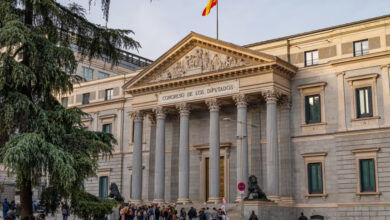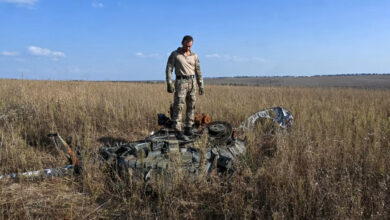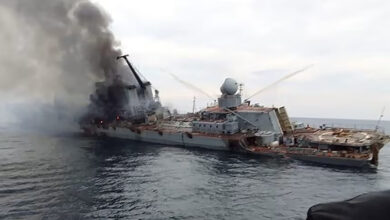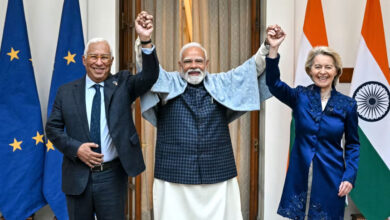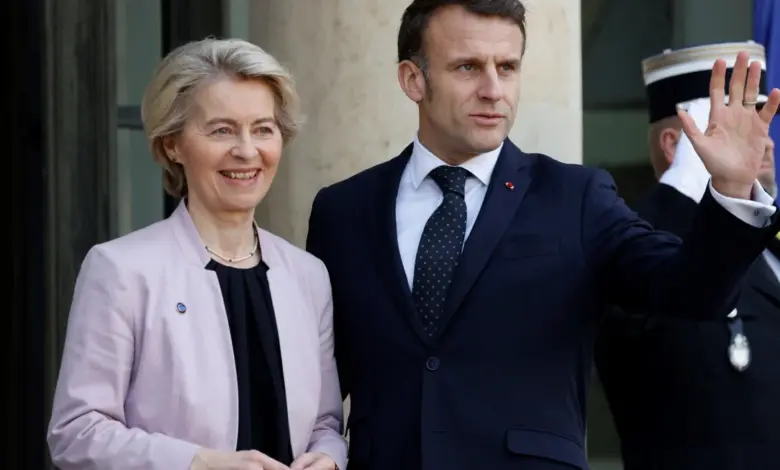
Reeling from shocks delivered by the Trump administration last week, European leaders held emergency talks in Paris on Monday as US and Russian officials prepare to meet in Saudi Arabia to discuss ending the war in Ukraine – without European or Ukrainian involvement.
Aside from a brief call Monday between French President Emmanuel Macron and his US counterpart Donald Trump, European leaders have been sidelined at the start of a pivotal week for the continent’s security.
Instead, the focus will be on US-Russia talks in Riyadh, where Secretary of State Marco Rubio will sit down on Tuesday with Russian Foreign Minister Sergey Lavrov, who said the discussion will aim to end the “abnormal period” in relations between the two “great powers.” Those talks could lay the ground for a potential meeting between Trump and Russian President Vladimir Putin.
Faced with the prospect of a diminished US footprint in Europe, the European leaders’ meeting focused on the potential deployment of European troops to Ukraine and the willingness of European allies to step up defense spending.
UK Prime Minister Keir Starmer, who called the Paris meeting a “one in a generation” moment for the continent’s national security, said afterwards that he is “prepared to consider committing British forces on the ground, alongside others, if there is a lasting peace agreement.”
Other European leaders also suggested stepping up in various ways.
NATO Secretary Mark Rutte told CNN that the Paris talks were a chance for European leaders to strategize on the best possible way to support a peace process, including discussions about many “wanting to put troops in Ukraine post a peace deal.” Rutte added that it’s “very important that the US is willing to provide a backup – so no troops on the ground, but a backup — enabling such efforts.”
“It means Europeans [are] willing to step up, getting positively engaged, willing to help out in Ukraine post a peace deal, including with troops if necessary, but clearly with an American backup — because you have to make clear that the deterrence is completely in place and that Putin will never try again,” Rutte said.
Ukrainian President Volodymyr Zelensky spoke with Macron after the Paris summit, reiterating his call for “robust and reliable” security guarantees for Ukraine, he said in a post on X.
Unraveling unity
During three years of war in Ukraine, Europe and the United States had remained remarkably united in their stance towards Russia. But just over three weeks into Trump’s second presidency, much of that unity has unraveled.
The Trump administration delivered a series of blows to Europe and Ukraine last week. First, Defense Secretary Pete Hegseth said that NATO membership for Ukraine was not a realistic outcome of a negotiated settlement, and that European security was no longer a priority for the US.
Then, Trump held a long phone call with Putin, effectively ending the Western policy of “nothing about Ukraine without Ukraine.” Then Vice President JD Vance turned on European leaders in a blistering speech at the Munich Security Conference on Friday, lambasting them for alleged crackdowns on free speech.
“The threat that I worry most about vis-a-vis Europe is not Russia,” Vance told a stone-faced audience. “What I worry about is the threat from within.”
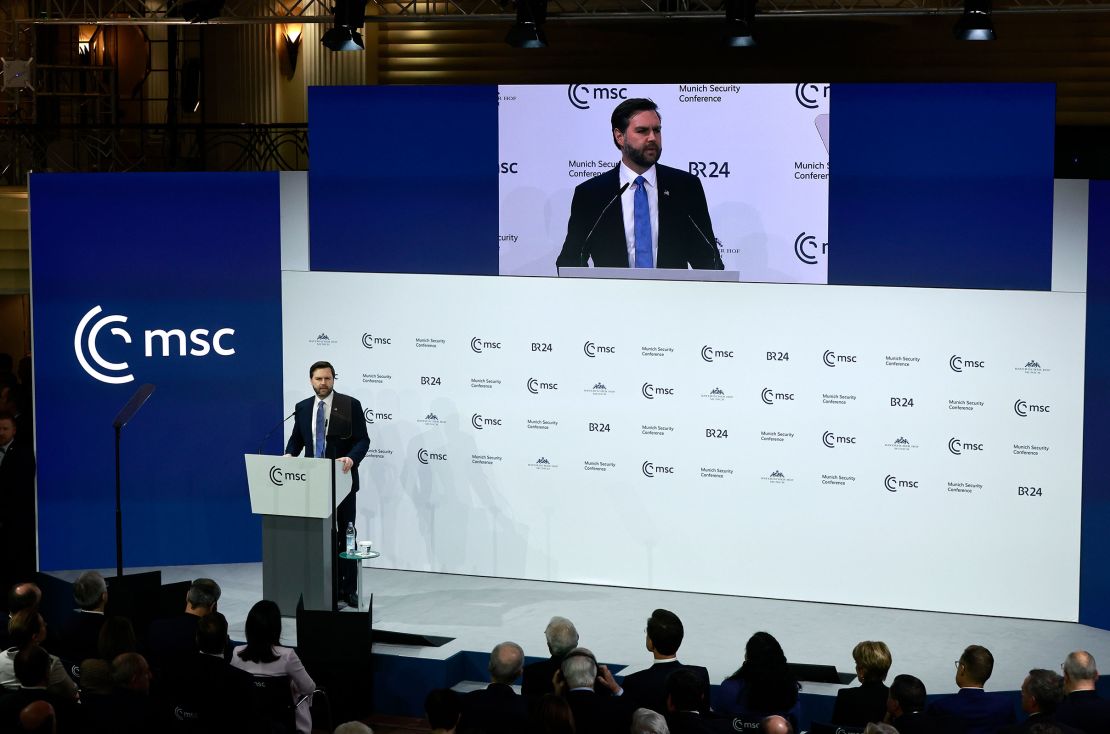
Nigel Gould-Davies, senior fellow for Russia and Eurasia at the International Institute for Strategic Studies, said the flurry of statements from the Trump administration had plunged Europe into “uncharted territory.”
In making concessions to the Kremlin before negotiations had begun, Gould-Davies said the Trump administration was showing “undue haste” that could create openings for Putin.
“If you are negotiating and you are showing that you’re the one that wants to get this done as quickly as possible. That puts you in a weaker position. There’s a lot for Putin to exploit,” he told CNN.
Zelensky said Ukraine will not participate in the US-Russia talks in Saudi Arabia, despite being in the country for separate meetings. He said any discussions “about Ukraine without Ukraine” will not bear fruit, and that Kyiv would reject a deal negotiated without Kyiv’s involvement.
Zelensky did, however, signal his openness to sign a deal that would grant the US access to Ukraine’s rare earth minerals, if Washington provides security guarantees to Kyiv in return.
“The question is not what Ukraine can give, but what can Ukraine get?” Zelensky said Monday.
After rejecting the Trump administration’s initial approach over the weekend, Zelensky said he would welcome a “more detailed plan.”
Zelensky also confirmed that Keith Kellogg, Trump’s Russia-Ukraine envoy, is expected to visit Ukraine on Thursday. Zelensky said he hopes to take Kellogg to meet soldiers on the frontline “so that he can see it at their level.”

But the bulk of the Trump administration’s diplomacy will be conducted in the Middle East, where Rubio will be joined in Riyadh by National Security Adviser Mike Waltz and Special Envoy Steve Witkoff, the State Department confirmed. The Kremlin said that Lavrov will be joined by presidential aide Yury Ushakov.
Rubio framed the talks as an attempt to determine whether Russia is serious about ending its war in Ukraine. Lavrov, however, signaled loftier goals, saying Trump and Putin “agreed on the need to leave behind an absolutely abnormal period in the relations between the two great powers.”
Asked by CNN whether Russia is willing to make compromises, Lavrov suggested it would take a hardline approach to negotiations.
Gould-Davies, a former UK ambassador to Belarus, said it was a “concern” that Europe will have a limited influence on a negotiated settlement, but will have to live with its consequences.
“It’s the Americans alone who are negotiating with Russia. But the Americans are also saying it is Europe alone who will have to enforce and guarantee and pay for any agreement that the Americans make over their heads,” he said.
“It’s no exaggeration to say this is the most serious crisis that the transatlantic alliance has faced,” he added.
Meanwhile in Paris, Rutte told CNN that he believes the United States intends to ensure Ukraine has a part in future negotiations.
“It is about Ukraine. So, Ukraine will be at the table, I have no doubt,” Rutte said following talks with the leaders of France, the United Kingdom, Germany, Italy, Poland, Spain, Netherlands, Denmark and the European Union.
When asked about the possibility that a peace deal could be struck without consulting Ukraine and NATO, Rutte said that “NATO, or Europe, have to be relevant to sit at that table if they want to. And I think the Europeans are now stepping up.”
Rutte also said the Trump administration was correct to say European NATO allies need to spend more on defense, adding that he believes it must be “north of 3%” of GDP in order to fill “huge gaps” in capabilities. “They were right. We have to spend more, and we will spend more.”
CNN’s Betsy Klein, Alex Marquardt, Kevin Liptak, Alayna Treene, Sugam Pokharel, Simone McCarthy, Manveena Suri, Anna Chernova, Svitlana Vlasova and Daria Tarasova-Markina contributed reporting.

